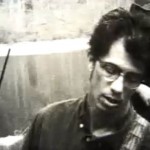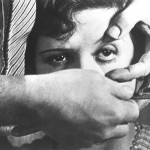Dir. by Andrei Tarkovsky
Images: Expressionistic camera angles, most notably in Ivan’s more terrifying dream sequences. Striking but occasionally heavy-handed symbolism, such as that beautiful cross amid the bombed-out landscape. Most memorable images are those that display Tarkovsky’s emerging aesthetic: the slow tracking shots through the birch forest, the close-ups of Ivan, the use of found footage, the final fantasy sequence.
• • •
A few summers ago, I had the rare opportunity to see Stanley Kubrick’s “lost” films at a special screening presented by the Mary Pickford Theater at the Library of Congress. His early shorts were interesting, of course, but the main attraction was his first feature, Fear and Desire (1953), a film that so embarrassed Kubrick in his later years that he reportedly collected and destroyed every print in circulation. According to the librarian who introduced the series, their print was discovered quite accidentally — a treasure among a collection of films shipped from a storehouse somewhere in Puerto Rico, as I recall. And much to Kubrick’s dismay, I’m sure.
I’m hesitant to introduce a response to Tarkovsky’s Ivan’s Childhood with mention of Fear and Desire for fear that the latter’s reputation might somehow tarnish the former’s. So let me make this point clear: Tarkovsky’s is a much, much better film, a great film even. But both suffer the effects of youth. This can on occasion be a good thing, of course. There’s often a refreshing fearlessness in the works of those artists who are still seeking a voice, who haven’t yet learned the rules and mastered the fundamentals. But that fearlessness is often matched by a naïve worldview and reckless ambition. Actually, in Kubrick’s case, I would go so far as to call that ambition hubris, as he and co-screenwriter Howard Sackler — who, like Kubrick was only in his mid-20s at the time — set out on a shoestring budget to make a film about “the two greatest motivating forces in human history,” or some such nonsense. Set in a fictional, dreamlike landscape amid a fictional, dreamlike conflict, Fear and Desire is a war picture drowning in banal allegory, notable only for its notoriety and for the occasional startling image that hints at all that would come in Kubrick’s five-decade career. I’m glad I saw it. Once.
That Ivan’s Childhood continues to impress and teach with repeat viewings is perhaps the best testament to the film’s lasting import. Like Fear and Desire, it is a war film that deliberately transcends many of the genre’s conventions, but it does so with a grace and humility that prevent Tarkovsky’s occasional missteps from spoiling the experience. Clearly, his aesthetic is still in gestation here. We’re offered brief glimpses of that mysterious poetic logic that informs his later work, but it is at times encumbered by weighty symbolism and Bergmanesque expressionism. Dare I say that Tarkovsky’s hand feels a bit heavy at times? If Paths of Glory is the first complete Kubrick film, the first to combine each of the particular stylistic devices and thematic obsessions that have come to define his status as an auteur, then I would argue that Andrei Rublev is our first taste of the full Tarkovsky, unburdened by another’s source material (he inherited the Ivan project from another director) and enlightened by palpable maturity, insight, and confidence.
Ivan (Nikolai Burlyayev) is a hollow-eyed orphan who, after watching his parents and young sister killed, fashions himself as a spy on the eastern front. In the film’s opening act, Ivan trudges through a swamp under the glow of enemy tracers, carefully working his way from behind enemy lines to a Russian outpost where he’s greeted by Lieutenant Galtsev (Yevgeni Zharikov), a commanding officer only a few years his senior. The twelve-year-old spy is exhausted and sickly but determined to deliver his intelligence to Colonel Gryaznov (Nikolai Grinko), who, we eventually learn, has become something of a father figure to Ivan. Gryaznov and Captain Kholin (Valentin Zubkov) conspire to secret Ivan away to a military academy, but the young soldier proves too stubborn and determined. He runs away, then, after being discovered hiding amid the desolate, bombed-out landscape, convinces his friends and superiors of his unique value to the cause. The remainder of the film documents the making of preparations for Ivan’s subsequent mission back into Nazi territory.
As with all of Tarkovsky’s work, a simple plot summary makes for an insufficient record of the film itself. Although it is the director’s most traditionally narrative-driven feature, Ivan’s Childhood is less concerned with war’s stories than with war’s human experiences and its aftermath: physical, emotional, and spiritual. At the risk of sounding pedantic, I would argue that, in this film, Tarkovsky forsakes the terrain of the traditional battlefield in order to more fully explore that of the embattled body. In an early scene, for instance, we watch as Ivan strips naked and bathes in a small metal drum. It’s a stunning image — Burlyayev, the young actor, is a pathetic, emaciated mess of ribs and knees and shoulders — an image that strips away the naïve romanticism that tends to accompany the genre. Tarkovsky’s camera exposes both Ivan and Lieutenant Galtsev not as the manly war heroes who they (and most war films) would imagine themselves to be, but as children without options.
When Galtsev later says of the young spy, “A war is no place for children,” his words are all the more poignant and absurd for coming from this teenaged officer’s mouth. He uses a similar line — “War is a man’s business” — after deciding to send Masha (Valentina Malyavina), a young nurse, home from the front. But, again, the line falls flat. It’s a false, empty performance of bravado, a deflation and deconstruction of the countless odes to heroic sacrifice that inform our stories of war — epic, mythological, literary, and cinematic. By treating such conventions truthfully and with seriousness, Tarkovsky manages to expose the dehumanization of war without slipping into cynicism or satire. (Would that an American filmmaker could avoid the same trap today.) The film’s final shot of Galtsev is also one of its most memorable. A few years older and with the war now behind him, Galtsev is quite literally scarred by his experience. But the actor’s young face refuses to lend the image the symbolic weight we might expect from the coda of a war film. He is not a wizened, toughened officer — a “man” who has proven his mettle in the manliest of arenas. Instead, like Ivan, he remains a boy, but one carrying tragic wounds.
Throughout the film, Tarkovsky makes remarkable use of close-ups of his actors’ faces (most notably, the final shots of Ivan) as a traditional technique for blurring the boundaries between objective and subjective experience. That blurring is critical to the success of this film, which is as much a psychological profile as it is a biography or war picture. We are offered access to Ivan’s subjectivity, in particular, through a series of dream sequences — some idyllic, others terrifying. But, really, the entire film is so closely bound to his perspective that it plays, with only a few notable exceptions, like Ivan’s psychic projection. Tarkovsky’s tack works quite successfully, for the most part. In Sculpting in Time, he writes:
in film, every time, the first essential in any plastic composition, its necessary and final criterion, is whether it is true to life, specific and factual; that is what makes it unique. By contrast, symbols are born, and readily pass into general use to become clichés, when an author hits upon a particular plastic composition, ties it in with some mysterious turn of thought of his own, loads it with extraneous meaning.
Ivan’s Childhood, I think, offers examples of both. There are, surprisingly for Tarkovsky, occasional missteps into symbolism — that beautiful but strangely empty image of a cross on the battlefield, for instance, or the cock-eyed camera angles that compose Ivan’s nightmares and that would feel more at home in Wild Strawberries than in Rublev. More often, though, the director manages to create moments that could only be described as Tarkovskyan — those amazing moments that make him one of the few geniuses of film. He’s at his finest in a sequence involving Masha and Captain Kholin, who pursues the nurse into a thick forest of birch trees. Tarkovsky’s camera tracks their movements at a distance before joining them, finally, in a strange, low-angle embrace over a small trench. The scene achieves his artistic ideal:
A true artistic image gives the beholder a simultaneous experience of the most complex, contradictory, sometimes even mutually exclusive feelings.
Kholin’s and Masha’s encounter is a desperate act of human contact, but it’s also vaguely degrading; it’s a moment of near transcendent delight, but it’s one that feels debased and compromised. I can’t make sense of it, really, though I feel compelled to, which is probably why Ivan’s Childhood is one of the few war films that I return to with any frequency. That complexity of emotions and motivations should always form the foundations of our war stories, or we’ll make the mistake of flattening the world, reducing its rich textures and varied peoples to stark black and white.









